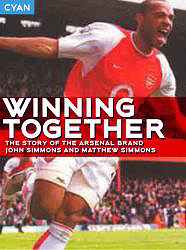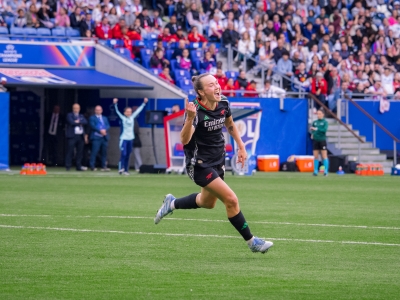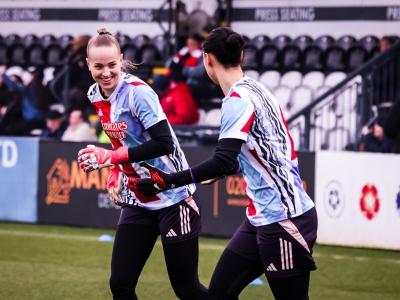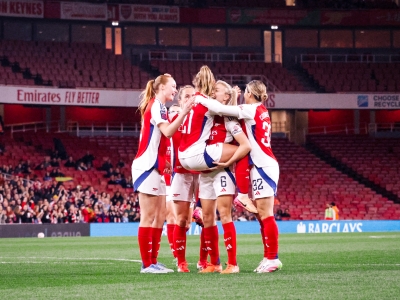Alex Fynn is a former deputy chairman of Saatchi & Saatchi, and a man who played a big role in the creation of the Premier League and the Sky TV contract. Since then he’s written some important books about the Arsenal, including The Glorious Game with Kevin Whitcher. He interviewed authors and Arsenal fans John and Matt Simmons about their new book – ‘Winning together: the story of the Arsenal brand’ published by Cyan Books, £8.99.
Alex: Why are we talking about the Arsenal ‘brand’? People seem to be talking about brands more and more, but what actually is a brand? And how relevant is it to a football club?
John: My background’s in branding but ‘brand’ has never been one of my favourite words. The word ‘identity’ gets closer to the reality of people identifying with a certain set of ideas. People often mistake brand to just mean the mark, the logo, that companies use to stamp their ownership on products. And then the company tries to make as much money as it can out of the use of that mark. Unfortunately that is the way the Arsenal commercial management seem to see the brand – a way to make money. But I think a brand is much more to do with what a company or organisation stands for, the values that drive it, the qualities that make customers and other audiences choose it rather than a competing brand. So, do you support Arsenal or Spurs? What do you see as the values that lie behind each of them? That’s really what the brand is all about. And in the case of football clubs, much to the envy of other kinds of brands, you get an amazing amount of brand loyalty. Very few ‘customers’ switch from one brand to another – because they’re really fans not customers. And that means clubs can take fans for granted in a way that other brands just couldn’t get away with.
Alex: And what qualifies you to talk about this?
John: I’ve been a director of brand consultancies like Interbrand, and I’ve written lots of books on branding. I’m editor of a series called ‘Great Brand Stories’ and this book on the Arsenal brand is in that series, aiming to demystify all the business-speak and write about brands in a way that we can all understand.
Matt: Above all else, I think the fact that we’re fans qualifies us – it’s a book written by fans, for fans.. I’d hope any Arsenal fan would enjoy this book, whatever their background. The interest we share is Arsenal. I just happen to have business knowledge because I work in management training for a successful brand called Pret a Manger.
Alex: So are you saying that the brand is not about making money?
Matt: The brand is about building a relationship. The most important relationship is between the players on the pitch who represent the brand and the fans who support it. Of course, money is part of that relationship – fans pay out a lot of money for their brand loyalty. Match tickets and entertainment, shirts and merchandise, Sky subscriptions and pay-per-view. There are lots of money-making opportunities for the owners of a brand. Furthermore, most fans understand this, and are quite happy to support their club financially – personally, if the money from my season ticket goes to buy Arsenal better players, I’m happy. What fans don’t like is when this financial support for the club tips over in to exploitation.
John: Which makes it all the more important for the brand owners – the club, the board, the management – to operate as fairly as possible. It’s only too easy to exploit the loyalty of fans. You can treat football fans badly and they’ll still turn up next Saturday to watch the next match. Other brands don’t have that luxury.
Alex: It seems to me that Arsenal’s good at striking deals, at buying and selling. They understand the money side of the brand. But do they understand the brand’s values?
John: I think Arsene Wenger does but I’m not so sure about management away from the playing side. It’s been interesting this year to hear and read how frequently Arsene has talked about ‘values’. He thinks like an enlightened brand manager.
Matt: You get the feeling that he’s used the financial situation – Chelsea ‘financially doped’ and we can’t compete with their roubles – to make clearer the difference between Arsenal’s values and those of Chelsea and others. It will give him, and us, more pleasure to succeed with a team raised with Arsenal values than one that’s been shipped in with loads of money.
Alex: So how do you define the Arsenal values?
John: Well, we go into this in detail in the book but the title gives the clue: “Winning together”. We’ve taken that as a loose translation of the old Latin motto “Victoria concordia crescit”. Rather than a cosmetic, mock-heraldic motto we think it has real meaning and it’s been part of Arsenal’s identity for a long time.
Matt: We go into descriptions of the values too – to do with pride and loyalty – but again it’s been interesting how “together” and “togetherness” have been words used again and again by the players in recent months. For me, the recent game against Spurs was interesting from a values point of view. Arsenal always, and I mean always, kick the ball out when an opposition player goes down, and always return it to the opposition when they kick it out for an injury. Arsenal do this even when they know the opposition are feigning injury, as against Villarreal. That Spurs should then break this convention, for the second time in ten years at Highbury, clearly offended Arsenal’s, and Arsene’s, set of values. To the players’ credit, when, late in the game, Spurs kicked the ball out for an injury, we returned the ball to them, despite most of our fans (myself included) screaming at them not to do so. Later, I realised our players were right and that, on this occasion, they had understood Arsenal’s values better than the fans.
Alex: So are there particular players you think represent the Arsenal brand and its values?
John: For one chapter of the book we focus on four captains – brand icons – who we think represent the Arsenal values. We interviewed two of them for the book – Frank McLintock and Pat Rice – and came out of those interviews with belief reinforced. The passion’s still strong in them.
Matt: The other two captains were Tony Adams and Patrick Vieira. We didn’t meet them – we tried – but we felt we knew them. We’d seen just about every match they played and read so much of what they’d said. And you can tell from them, their behaviour, what made them Arsenal. Even this week Kolo Toure’s been talking about the influence of Tony Adams on him.
Alex: How does the current team represent those values?
Matt: We’ve used quotes from players like Henry and Pires to demonstrate the values. Even if Henry leaves, we’ll wish him well and he’ll always be an Arsenal man. He’s behaved well. I’d say that about the rest of the team, with my biggest doubt about Ashley Cole.







